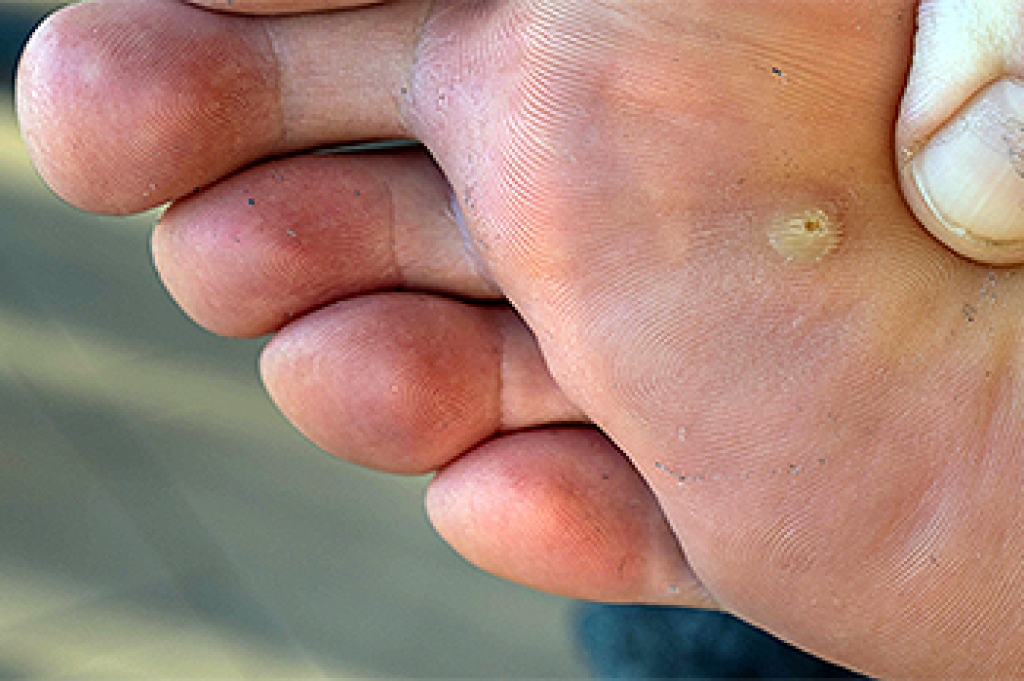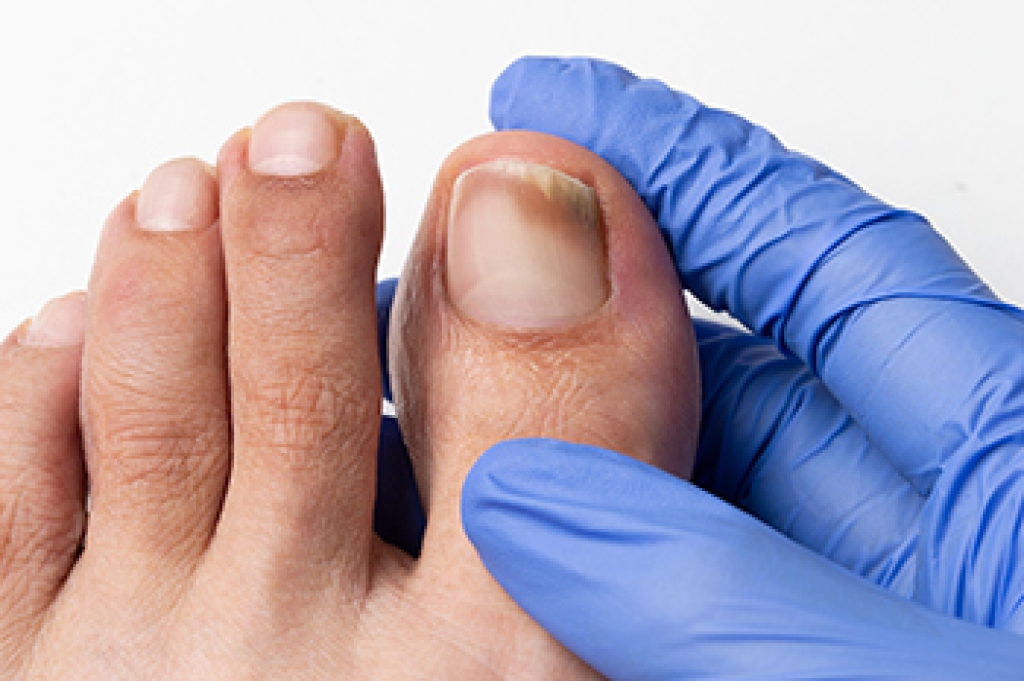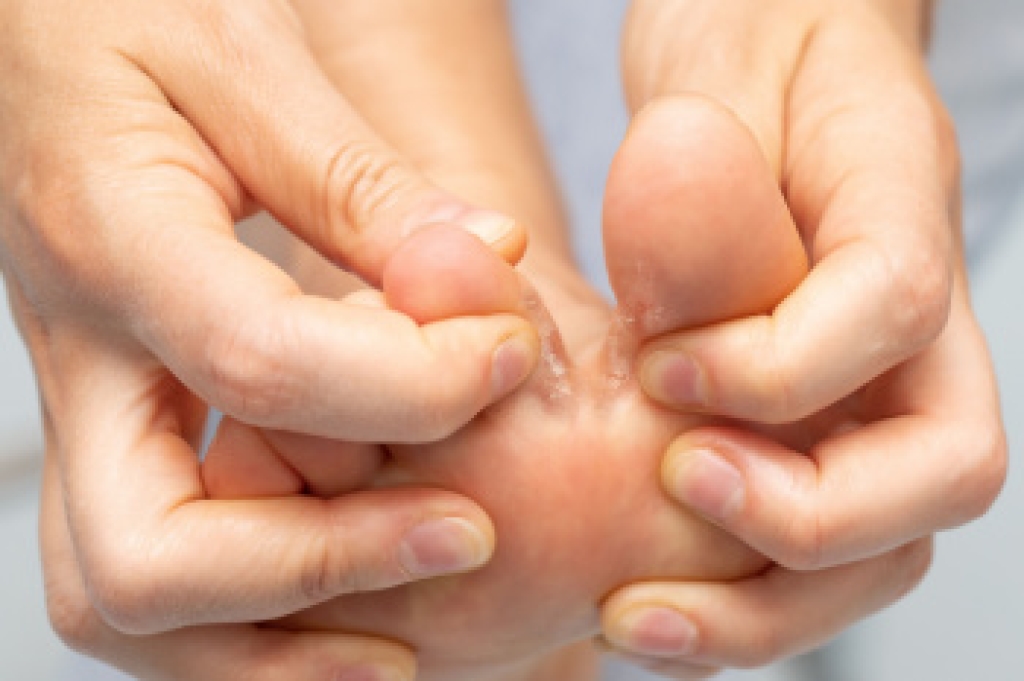Blog
Risk Factors for Plantar Warts

Plantar warts are growths that develop on the bottom of the foot due to a viral infection in the skin. They can become very painful, especially when they form on weight-bearing areas, making standing or walking uncomfortable. These warts are caused by the human papillomavirus, or HPV, which enters the skin through small cuts or weak spots. Symptoms include a rough patch of skin, tiny black dots in the center, and tenderness when pressure is applied. Children and teenagers are most vulnerable because their immune systems are still developing. The virus spreads in warm and moist environments such as locker rooms and pools. Plantar warts can be painful as they grow inward on the sole of the foot as a result of walking and standing. A podiatrist can provide effective treatments that remove discomfort and prevent recurrence. If you have developed a plantar wart, it is suggested that you promptly schedule an appointment with a podiatrist who can offer effective relief and treatment solutions.
Plantar warts can be very uncomfortable. If you need your feet checked, contact Franklin Harry, DPM from Best Foot Forward. Our doctor will assist you with all of your foot and ankle needs.
About Plantar Warts
Plantar warts are the result of HPV, or human papillomavirus, getting into open wounds on the feet. They are mostly found on the heels or balls of the feet.
While plantar warts are generally harmless, those experiencing excessive pain or those suffering from diabetes or a compromised immune system require immediate medical care. Plantar warts are easily diagnosed, usually through scraping off a bit of rough skin or by getting a biopsy.
Symptoms
- Lesions on the bottom of your feet, usually rough and grainy
- Hard or thick callused spots
- Wart seeds, which are small clotted blood vessels that look like little black spots
- Pain, discomfort, or tenderness of your feet when walking or standing
Treatment
- Freezing
- Electric tool removal
- Laser Treatment
- Topical Creams (prescription only)
- Over-the-counter medications
To help prevent developing plantar warts, avoid walking barefoot over abrasive surfaces that can cause cuts or wounds for HPV to get into. Avoiding direct contact with other warts, as well as not picking or rubbing existing warts, can help prevent the further spread of plantar warts. However, if you think you have developed plantar warts, speak to your podiatrist. He or she can diagnose the warts on your feet and recommend the appropriate treatment options.
If you have any questions, please feel free to contact our offices located in Festus and St. Louis, MO . We offer the newest diagnostic and treatment technologies for all your foot care needs.
Toenail Fungus and When to Seek Podiatric Care

Toenail fungus affects the nails and surrounding tissue, often beginning as a small white or yellow spot that gradually spreads. Symptoms may include thickened nails, discoloration, brittleness, crumbling edges, or an unpleasant odor. Causes include exposure to fungal organisms in warm and moist environments, such as locker rooms or tight footwear. Risk increases for older adults, people with sweaty feet, those with weakened circulation, and individuals who frequently walk barefoot in public areas. A podiatrist can diagnose the infection, provide advanced treatments, trim damaged nails, and offer guidance to prevent future problems. If you have any of the above symptoms, it is suggested that you schedule an appointment with a podiatrist who can offer effective relief and treatment solutions, which may include prescribed medication.
For more information about treatment, contact Franklin Harry, DPM of Best Foot Forward. Our doctor can provide the care you need to keep you pain-free and on your feet.
Toenail Fungus Treatment
Toenail fungus is a condition that affects many people and can be especially hard to get rid of. Fortunately, there are several methods to go about treating and avoiding it.
Antifungals & Deterrence
Oral antifungal medicine has been shown to be effective in many cases. It is important to consult with a podiatrist to determine the proper regiment for you, or potentially explore other options.
Applying foot powder on the feet and shoes helps keep the feet free of moisture and sweat.
Sandals or open toed shoes – Wearing these will allow air movement and help keep feet dry. They also expose your feet to light, which fungus cannot tolerate. Socks with moisture wicking material also help as well.
If you have any questions please contact our offices located in Festus and St. Louis, MO . We offer the newest diagnostic and treatment technologies for all your foot and ankle needs.
The Athletic Foot Powers Every Move and Jump

Every sport begins at ground level, with your feet. They support your body, absorb impact, and power every stride, jump, and pivot. Even small differences in foot structure, such as toe length or arch height, can influence how you move, balance, and perform. A longer big toe, for example, helps athletes push off with greater force in sprinting or skiing, while strong arches provide stability during side-to-side motions in tennis or basketball. Yet, the same mechanics that make feet powerful also make them vulnerable. Overuse, poor footwear, or uneven surfaces can lead to sprains, stress fractures, Achilles tendon injuries, or plantar fasciitis. Maintaining strength and flexibility in the feet and ankles helps prevent these issues. If you experience persistent pain or swelling in your feet or ankles from sports activity, it is suggested that you visit a podiatrist for evaluation and treatment.
Ankle and foot injuries are common among athletes and in many sports. They can be caused by several problems and may be potentially serious. If you are feeling pain or think you were injured in a sporting event or when exercising, consult with Franklin Harry, DPM from Best Foot Forward. Our doctor will assess your condition and provide you with quality foot and ankle treatment.
Common Injuries
The most common injuries that occur in sporting activities include:
- Achilles Tendonitis
- Achilles Tendon Rupture
- Ankle Sprains
- Broken Foot
- Plantar Fasciitis
- Stress Fractures
- Turf Toe
Symptoms
Symptoms vary depending upon the injury and in some cases, there may be no symptoms at all. However, in most cases, some form of symptom is experienced. Pain, aching, burning, bruising, tenderness, tightness or stiffness, sensation loss, difficulty moving, and swelling are the most common symptoms.
Treatment
Just as symptoms vary depending upon the injury, so do treatment options. A common treatment method is known as the RICE method. This method involves rest, applying ice, compression and elevating the afflicted foot or ankle. If the injury appears to be more serious, surgery might be required, such as arthroscopic or reconstructive surgery. Lastly, rehabilitation or therapy might be needed to gain full functionality in the afflicted area. Any discomfort experienced by an athlete must be evaluated by a licensed, reputable medical professional.
If you have any questions please contact our offices located in Festus and St. Louis, MO . We offer the newest diagnostic and treatment technologies for all your foot and ankle needs.
Complications of Athlete’s Foot

Athlete’s foot is a frequent fungal infection that usually begins between the toes but can spread if left untreated. When the skin cracks or peels, bacteria can enter, leading to secondary infections that may cause redness, swelling, and pain. In severe cases, these infections can spread to the toenails, resulting in thickened, discolored nails that are difficult to treat. For people with diabetes or poor circulation, untreated athlete’s foot can cause serious complications, including ulcers or cellulitis, a deep skin infection that may require antibiotics. The condition can also spread to the hands or other areas of the body through scratching or contaminated surfaces. Keeping feet clean and dry, changing socks regularly, and using antifungal treatments early can help prevent these complications. If your symptoms persist or worsen, it is suggested you see a podiatrist for diagnosis and appropriate treatment.
Athlete’s foot is an inconvenient condition that can be easily reduced with the proper treatment. If you have any concerns about your feet and ankles, contact Franklin Harry, DPM from Best Foot Forward. Our doctor will treat your foot and ankle needs.
Athlete’s Foot: The Sole Story
Athlete's foot, also known as tinea pedis, can be an extremely contagious foot infection. It is commonly contracted in public changing areas and bathrooms, dormitory style living quarters, around locker rooms and public swimming pools, or anywhere your feet often come into contact with other people.
Solutions to Combat Athlete’s Foot
- Hydrate your feet by using lotion
- Exfoliate
- Buff off nails
- Use of anti-fungal products
- Examine your feet and visit your doctor if any suspicious blisters or cuts develop
Athlete’s foot can cause many irritating symptoms such as dry and flaking skin, itching, and redness. Some more severe symptoms can include bleeding and cracked skin, intense itching and burning, and even pain when walking. In the worst cases, Athlete’s foot can cause blistering as well. Speak to your podiatrist for a better understanding of the different causes of Athlete’s foot, as well as help in determining which treatment options are best for you.
If you have any questions please feel free to contact our offices located in Festus and St. Louis, MO . We offer the newest diagnostic and treatment technologies for all your foot and ankle needs.

